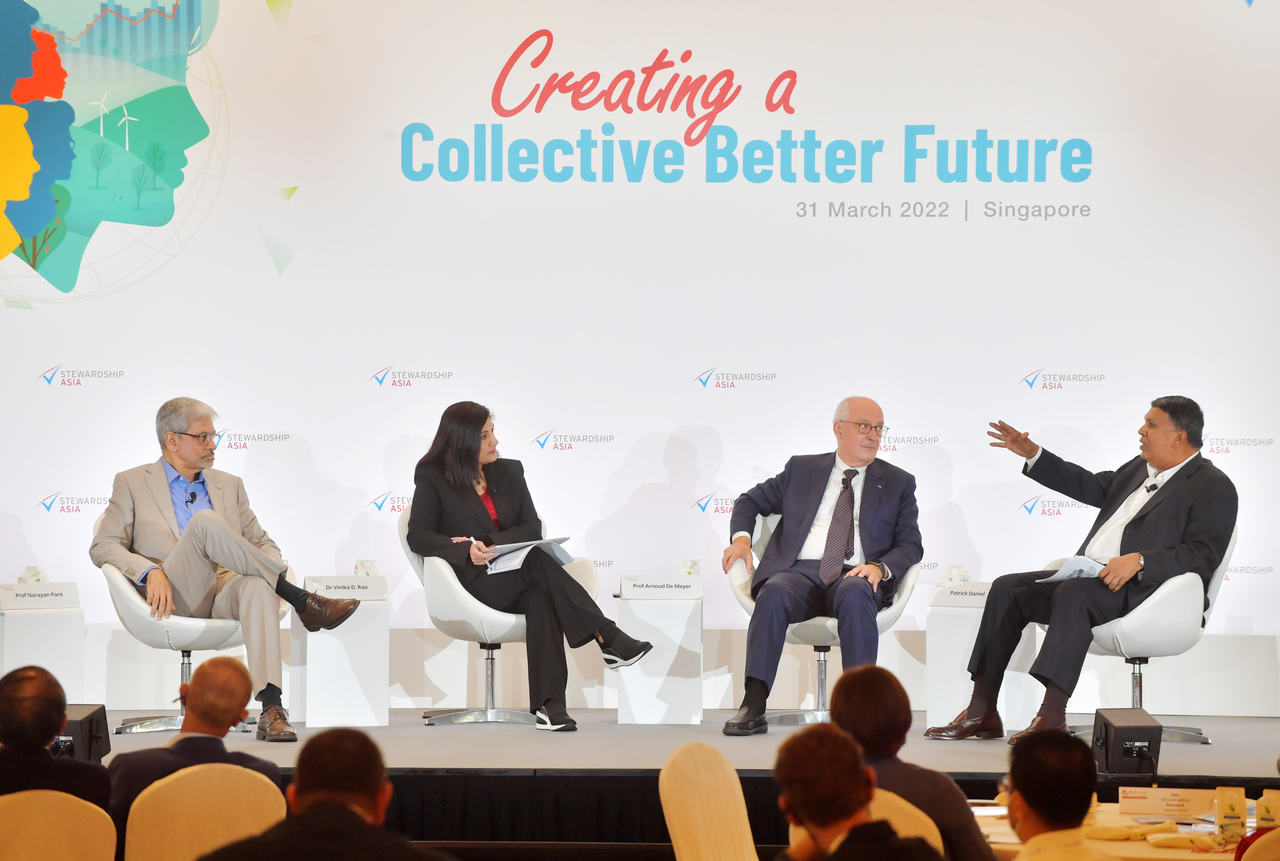Companies today must strike balance between profit and purpose: Panel
Sign up now: Get ST's newsletters delivered to your inbox

SPH Media Trust former interim CEO Patrick Daniel (at right) speaking at yesterday's Stewardship Asia Roundtable 2022 with (from left) Professor Narayan Pant, moderator Vinika D. Rao, and Professor Arnoud De Meyer.
ST PHOTO: ALPHONSUS CHERN
Follow topic:
SINGAPORE - When economist Milton Friedman wrote in his 1970 essay that a company's sole responsibility was to shareholders, and not to the public or society, he was addressing the sociopolitical context of that time.
In the years since, the world has changed and the responsibilities of companies and their chief executives have evolved.
Panellists at Thursday's (March 31) Stewardship Asia Roundtable 2022 generally agreed on this during their debate on what it means to be a socially responsible corporate leader.
Professor Arnoud De Meyer, chairman of the Stewardship Asia Centre, pointed out that the broader stakeholder was more important than the company shareholder in today's corporate context.
"Professor Friedman's thesis was based on several assumptions," he said.
"These included perfect market transparency, no externalities and the assumption that we can write perfect contracts.
"It was a styled model that does not exist in reality."
He was referring to the groundbreaking essay by the American economist published in the New York Times in 1970.
The Nobel laureate argued that a company had no social responsibility to the public or society.
Its one and only responsibility was to its shareholders.
This theory and the resultant belief in "trickle down economics and wealth" carried a lot of weight through the 1980s and 1990s, with powerful proponents like then United States President Ronald Reagan and then British Prime Minister Margaret Thatcher.
They implemented hard-nosed monetary policies espoused by the late economist.
Prof De Meyer said today's world is a very different place, facing very different and complex challenges - such as climate change, wealth disparity and social disruption - which cannot be addressed by such simple theories.
"Companies have a broader purpose in today's real world," he noted.
"The question is, what is this purpose and how does it align with the needs of society?"
Fellow panellist, Professor Narayan Pant, leadership development chair at Insead, said that while there was no argument about the goal of maximising stakeholder returns rather than just shareholder returns, the question was about how to get there.
"CEOs need to be incentivised, and there has to be accountability," he said. "What are the best mechanisms to achieve this in today's context?"
Mr Patrick Daniel, who sits on the board of SPH Media Trust, pointed to company boards as key players in this, adding: "Boards must spell out the role and responsibilities of the CEO.
"They must define the values of the company and identify its various stakeholders."
Mr Daniel, who was interim CEO of SPH Media Trust, added that the board should also set key performance targets which go beyond just profitability.
But he warned that even while holding a CEO responsible for sustainability and social targets, the challenge was also to ensure that these goals do not clash with the profit objectives of the company.
Joining the panel via video from the US was CNN Business anchor Richard Quest, who suggested that many corporate boards were packed with cronies of the senior management who might not set the appropriate targets.
"The CEOs themselves need a strong moral compass on the issues of the day," he added.
Panellists noted that given today's context, CEOs who were purely profit-driven and ignored environmental, social and societal issues would face serious long-term challenges in growing their companies as they would not be able to retain talent or attract investments.

